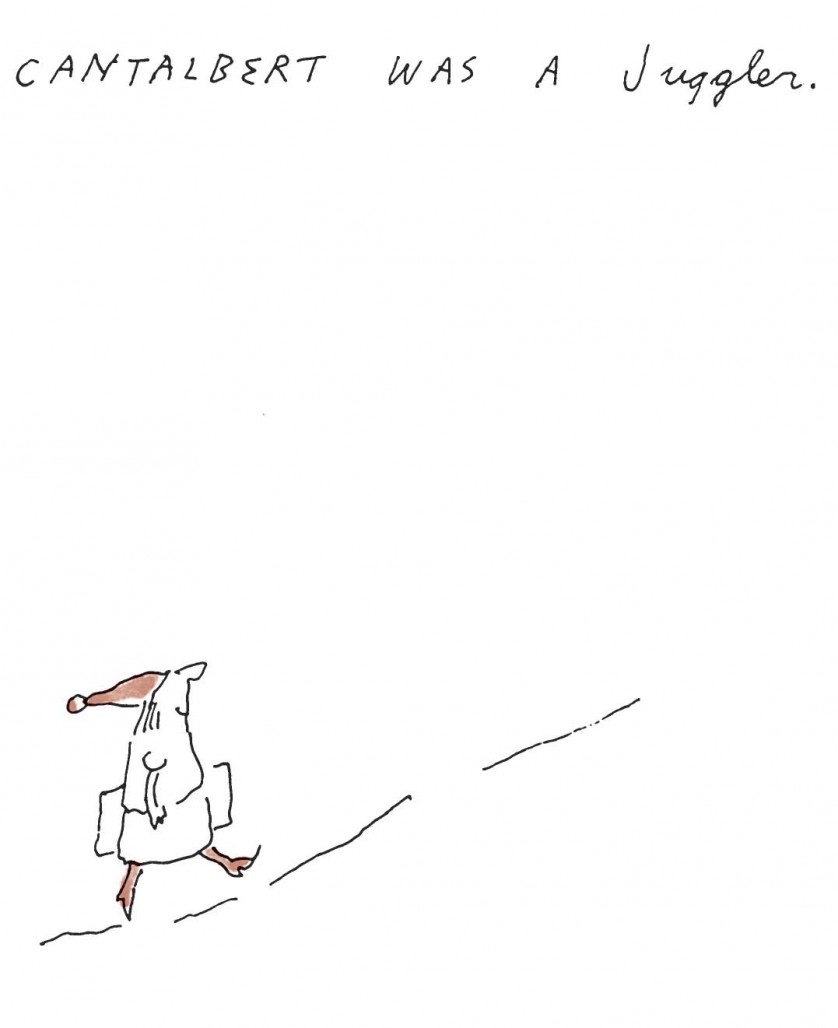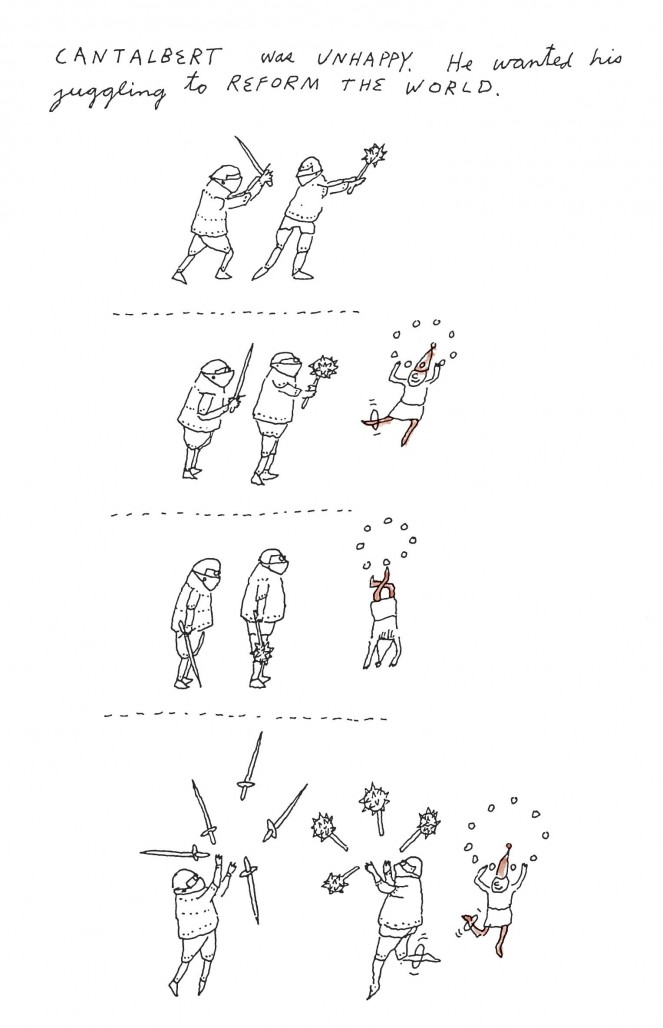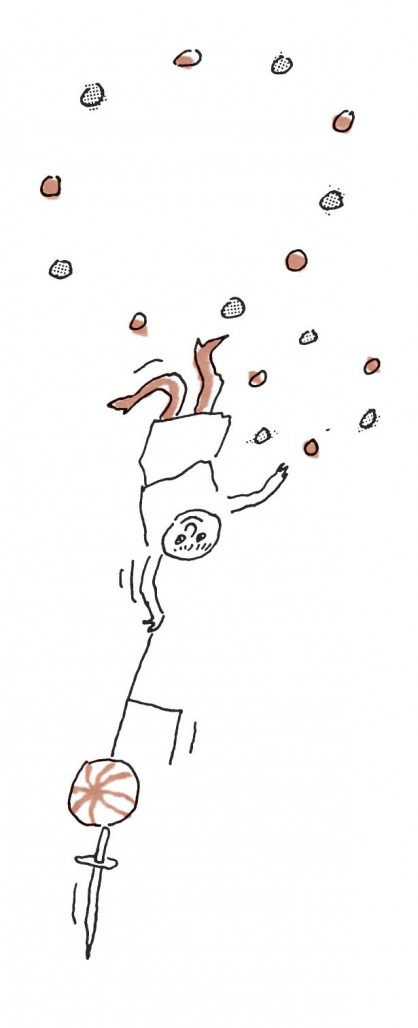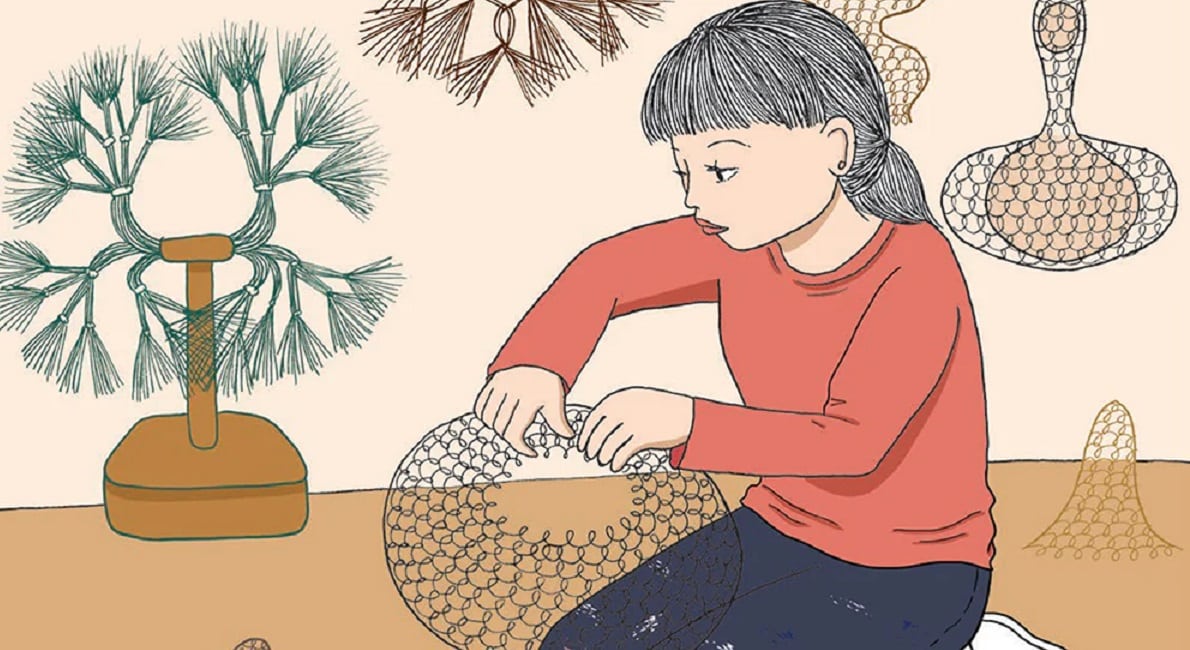 by Alex Dueben
by Alex Dueben
R.O. Blechman has had an extraordinary career. He’s a cartoonist, illustrator, animator, children’s book author. He’s created famous advertising work, directed award winning television projects, and ran an animation studio, The Ink Tank, for more than twenty years. He was a regular contributor the Harvey Kurtzman-edited publications Humbug and Trump. His work has also appeared in The New Yorker, The Atlantic Monthly, Harper’s Bazaar, Story, and other publications. He directed films like Simple Gifts and The Soldier’s Tale. He designed the award-winning title sequence for the legendary television miniseries The Life and Adventures of Nicholas Nickleby. Blechman has received many awards including the Milton Caniff Lifetime Achievement Award from the National Cartoonists Society. He’s been inducted into the Art Directors Hall of Fame. He’s been the subject of a retrospective at the Museum of Modern Art. He also published his first graphic novel in 1952. And no, that’s not a typo. His first graphic novel was published more than 60 years ago.
Blechman turned 85 this year, but he remains energetic and continues to work on new projects, with a new book, Amadeo and Maladeo, out from Fantagraphics next year. He’s also developing a new film that would combine live action and animation. Dover has just reissued his first book, The Juggler of Our Lady, a Christmas story that was later turned into an award-winning animated short film by Gene Deitch. The new edition includes a forward by Jules Feiffer and an introduction by Maurice Sendak. Mr. Blechman was kind enough to take the time to discuss the book and his career.
Alex Dueben: The Juggler of Our Lady came out originally in 1952. I wonder if you could put this in some context of your career because people may not know this book, but they likely know some of your later work.
R.O. Blechman: I was a student at a college in Ohio and I took a seminar in humor, of all things. Interestingly it was taught by a colleague of the film director Luis Bunuel. Also interestingly, there were only about seven people in the seminar and one of them was William Goldman, the screenwriter. He wrote a short story for the seminar as his term paper and got a B minus. I did a graphic novel–although we didn’t call it that in those days–about the fall of Rome. I also got a B minus. We were the only two people to go onto professional careers. All those stars with A’s and B pluses dropped out along the way.
When I graduated I took my portfolio, which mostly consisted on editorial cartoons I did for the college newspaper, to various magazines and also to an art studio of a guy who did book jackets for Henry Holt. He saw my book and he said this is good, why don’t you show it to an editor I work for. So I did. The editor liked it but said we can’t really publish anything that isn’t of a seasonal nature. It has to have a hook. So I called a friend of mine up and I said, Paul, do you know of any good Christmas stories or Easter stories? He said, I know this medieval story called The Juggler of Our Lady. The next day I got a copy of it and that evening I think I wrote the book. It was quick. I brought it to the editor and he must have been surprised that he saw me again and he liked it.
So the book was published in 1952. There was a lot of back and forth because there was a third color, which is the yellow when the Virgin Mary appears. They eventually gave me the third color, reluctantly. It did very well. Not in terms of sales but it got a lot of press and I did a lot of interviews. I was then drafted into the army because the Korean war was going on. Incidentally, the art director who first suggested I go to Henry Holt designed the book jacket–which I hated. I was unable to do it because I was in the army at the time, even though I saw it when I was in basic training. I said I’d like to leave basic training because I have to go back to New York and re-do the jacket of a book that I had written and drawn. The Lieutenant said, “show it to me.” I did and he said, “what’s wrong with this?” I said the colors are all wrong and the idea is all wrong, it doesn’t go with the spirit of the book. He said, “it looks all right to me. Soldier, you are in basic training in the United States Army. You don’t have any grounds for leaving.”
In any event that’s the back story of it. It’s been reprinted a few times. This is the second or third reprinting. What’s nice about this version, which is very well done by Dover, is that they asked Jules Feiffer to write a forward and they used something that Maurice Sendak had already written for an anthology of my work which came out in 1980.
Dueben: I’m entertained by the idea that if the Lieutenant had hated the book cover, he would have found a way to let you go.
Blechman: [laughs] Not in the United States Army!
Dueben: Your piece about the fall of Rome, was it a book length piece like The Juggler of Our Lady?
Blechman: It’s called Titus Fortunatus, or Why Rome Fell. I had crazy luck. Luck that I did a graphic novel before they were ever done, I guess. That’s not quite true. Jules Feiffer says that I’m the first but I don’t think that’s true at all. I’m no historian but there was Lynd Ward– although he didn’t use words– but go back to the 18th and 19th centuries. There was Rudophe Topfer who did great graphic novels. There was Milt Gross. In any event it’s irrelevant.
Dueben: What inspired you to make a book length comic? You grew up in the heyday of newspaper comics, but what inspired you to tell these longer stories?
Blechman: When I was in high school I traveled to Nantucket and I was so excited by it that I did a graphic novella all about Nantucket. I’ll tell you a little anecdote which is kind of wild. I had seen the cartoons of Saul Steinberg in the local newspaper, PM. I so loved his stuff and I don’t think he did any work for The New Yorker at that time but I sent him a 24 page book which I had hand sewn. It was all about why I needed to have any kind of drawing that he could possibly send me. I learned later he was getting letters from Jules Feiffer, who was not getting any drawings, and John Updike, who got a drawing. I also got a drawing, which I still have.
Dueben: Wow.
Blechman: Wow is right. It’s beautifully drawn. It’s inscribed “To R.O. Blechman. Steinberg 1949.” I later learned from a guy who wrote a book about Steinberg that he had kept my 24 page booklet. I was also told he was something of a pack rat who kept everything. I would have liked it if he wasn’t a pack rat but still kept it.
I think the reason I made comics was because I liked to write as much as draw. ” My drawings are nothing to speak of, as you can tell from The Juggler, but the story was good. It had an honesty to it and sweetness to it, but not much draftsmanship to speak of.
Dueben: In Jules Feiffer’s forward to the book, he mentions how he first met you, which was working on the animated version of The Juggler for Terrytoons Studios.
Blechman: It has a lovely soundtrack, by the way. The guy did junky stuff for junky films so he must have been thrilled to get an assignment for something like this. He did a wonderful soundtrack. I’ve always thought of myself more as a potential filmmaker than a graphic artist.
Dueben: Really?
Blechman: I think so many graphic novelists are really potential filmmakers. What is the graphic novel but a potential storyboard for a film? In any event, I was just the associate director on this thing. I would have done things somewhat differently. Jules and I were both traveling from Manhattan to New Rochelle, where the studio was located, and we became quite close through the years.
Dueben: Can you talk a little about the making of the film?
Blechman: I don’t remember much about it. I don’t even remember if I did the storyboards. I probably did, but not necessarily. The coloring was done with crayons and colored pencils and it bothered the hell out of me. It was a very period thing. 1954? 1958? That bothered me. But it was an okay film. Again I didn’t have all that much control over it.
I have an ongoing argument with Gene Deitch, the director. He thought that he had proposed Boris Karloff as the voiceover but I know that it was my idea because it was not my idea, it was the idea of William Goldman, my former classmate. He said, what about Boris Karloff doing the voiceover. Sorry, Gene Deitch. We differ there. But we’re going back more than a half century, so it’s understandable.
Dueben: Nowadays people don’t think that odd because of course Boris Karloff also narrated How the Grinch Stole Christmas, but back then was this an unusual choice?
Blechman: Sure it was. He was typecast, but he was a wonderful actor. Do you know the film that I directed, [Simple Gifts] which was a retelling of a section of Virginia Woolf’s Orlando? A friend of mine suggested using an English comedienne–as they were called in those days–Hermione Gingold. You’re probably too young to know who she was, but she was known for her comic bits and she was great. When you go against typecasting, you can see other things in a person’s ability that isn’t well known.
I’m working on a storyboard for a film now. God knows if it’ll ever be done, but I like it a lot. It involves animation and live action and a crazy mixture of both. I hope to be working with Bill Plympton. I just finished a little film with Bill Plympton and we’ll see what happens with this one. I feel like I should have been more of a filmmaker than an artist/illustrator/graphic novelist/cartoonist, but I took a crazy turn in my life and ended up doing what I’m doing. I really love doing films more than anything else. My last big film was twenty-five or so years ago. A version of Stravinsky’s L’Historie du Soldat. It had some very good stuff in it. I had an animation studio for 27 years but about ten years ago it folded. Now except for the thing I did recently with Bill Plympton for The New York Times, I’m quite inactive in terms of film.
Dueben: You’ve done so many things in your career. You had your own animation studio for decades, you did advertising work, you directed some films, you were making comics and illustrations and kids books and adult books. Ho do you think about your career?
Blechman: What do I think of my career? I’d rather be doing films. I’m 85 years old. I don’t have that much time left, but I still have my energy and I’d love to devote that energy to films more than books. Books are stillborn films–at least my books.
Dueben: You would have done things differently if you had to do it again.
Blechman: I had so many chances to go to Hollywood and make films. I made some bad choices, but I’m around and I’m working on this storyboard and who knows. Right after The Soldier’s Tale I got a telephone call from a lady with a German accent saying that she saw the film, liked it very much and wondered whether I would be willing to do a feature film of her husband’s book. I asked what the book was and she said, Curious George. I said I read it to my kids, I love the book. She said, would you be interested in doing it? I said no. The reason is after I had done a film of Igor Stravinsky’s music, was I going to make a movie about a monkey? I wish I had. It would have a good film. I really made a mistake. I had it in mind to do something either on Voltaire’s Candide, not the Leonard Bernstein version, or The Golden Ass by Apuleius. We all make mistakes. Those were mine. I made other mistakes but I won’t get into those.
Dueben: Next year is a busy year for you. You have two books coming out, is that right?
Blechman: I have two more books coming out. One is called Georgie. Dover is putting that out around the end of the year. It’s a reissue. It appeared as a short piece in a book that Drawn and Quarterly put out in 2009 called Talking Lines with a very nice introduction by Seth. Then it was published as a separate book in France and thank god Dover is doing it and doing it very well I think.
Then I have another one coming out and this is a great one, I think. It’s called Amadeo and Maladeo. It’s a riff on Mozart if you can imagine anything so quixotic. That’s in full color and it’s being put out by Fantagraphics. They did a beautiful job. That will be coming out in February. It’s a good story and nicely drawn.
Dueben: I remember Georgie from your book Talking Lines, which was a great collection of your comics work.
Blechman: That was one of my best books. I really liked that. Chris Oliveros was very, very helpful. He was a terrific editor, a good person. Runs a good operation. I’m lucky to have worked with Drew Ford [at Dover]. It was very adventurous of him to reissue The Juggler of Our Lady and to also have taken on Georgie. Also working with the head of Fantagraphics, Gary Groth. These are three terrific people to be working with. They have and are adding so much to the work.
Dueben: And after that, hopefully a movie.
Blechman: We’ll see. The movie is based on an artist whom very little is known, Ralph Barton. John Updike wrote about him and there was a biography that I’m using as the basis. A very interesting guy and a very good artist. Lost in the cracks of time.


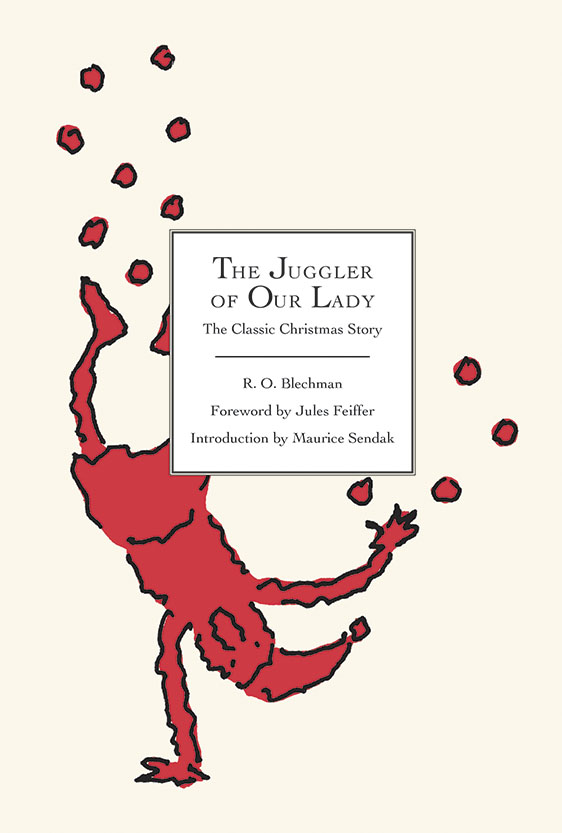
 by Alex Dueben
by Alex Dueben